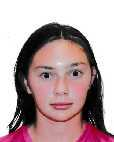If you want to cheer yourself up this afternoon,or just want a quick burst of inspiration, jump on to the BBC iPlayer and watch this heat unfold. It only takes a couple of minutes.
Due to low numbers of competitors, all participants will be appearing in the final so you might think they would take it easy – save their strength for the big one later this evening maybe.
Obviously these competitors hadn’t read that script
Maybe it was wanting the best lanes in the finals, or wanting to blow off the cobwebs, whatever, these women went for it, narrowly missing a new World Record in the process.
Maddison Elliott (Australia) came in first with a time of 1.06.45
Stephane Slater (England) who came in second is just an absolute marvel. Swimming this with one arm in 1.07.38. Most able bodied swimmers wouldn’t get near a time like that. Go try it next time you’re in a pool.
Maddison Elliot
Type of Impairment
Cerebral Palsy
Impairment Details
She was diagnosed with cerebral palsy at age four. The condition affects the right side of her body.
Reason for taking up this sport
Swimming is good therapy for her impairment. She also enjoys the sport and finds it a good way to make new friends.
Ambitions
To compete at the 2016 Paralympic Games in Rio de Janeiro.
Most memorable sporting achievement
Winning gold at the 2012 Paralympic Games in London.
Hero
Australian para-swimmer Matt Cowdrey.
Stephane Slater
Type of Impairment
Impaired range of motion
Impairment Details
She was a promising able-bodied athlete with the potential to represent Great Britain at the 2012 Olympic Games in London until nerve damage to her left arm affected her swimming. “I was an international breaststroker and I specialised in the sprint events. I was just training one day and I couldn’t pull with my arm at all. Two years down the line I found out that I’ve got nerve damage to the lower part of my brachial plexus and I can’t use my left arm now.” In 2014 she was diagnosed with dystonia, leading to muscle spasms and fatigue.
Start of sporting career
She began swimming at age three at Nick’s Swimming School in Longridge, England.
Reason for taking up this sport
She was a promising gymnast in addition to swimming, but she had to make a choice about which sport she would focus on as she got older. She ultimately chose swimming.
Ambitions
To compete at the 2016 Paralympic Games in Rio de Janeiro.
Training
Most of her training takes place at the Great Britain para-swimming base in Manchester, England.
Most memorable sporting achievement
Breaking the British and European record in the 100m butterfly at her first major para-swimming event in 2013.
Hero
South African swimmer Natalie Du Toit, British heptathlete Jessica Ennis.
Most influential person in career
Coach Steve Heaps and her family.
Sporting philosophy / motto
“Work hard, believe in yourself and always give 100% effort in everything you do with a smile.”
General
MEDICAL CONDITIONS
In addition to the nerve damage she sustained to the lower part of her brachial plexus, which means she has a limited range of motion in her left arm, she also has a degenerative eye condition and problems with her balance due to one of her legs being slightly longer than the other.





